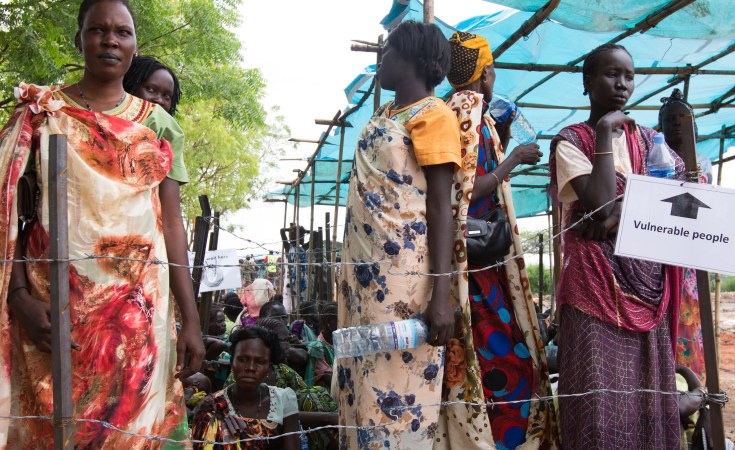Cape Town — As peace talks between leaders in Juba and their former allies in government sputter on, and aid agencies warn of a looming famine, major human rights lobbies are pressing for a United Nations arms embargo on South Sudan.
In a 92-page report released Friday, the New York-based group, Human Rights Watch, calls on the UN Security Council to impose a comprehensive arms embargo and targetted sanctions - including travel bans and the freezing of assets - on individuals who break the embargo or commit serious violations of international humanitarian law.
In the same report, the group says that since the Juba government split in two on ethnic lines late in 2013, and the parties went to war, both sides have "committed extraordinary acts of cruelty that amount to war crimes and in some cases potential crimes against humanity."
The report adds: "These forces have pillaged and destroyed civilian property including homes, humanitarian infrastructure like the cars and offices of aid agencies, and medical facilities, including key hospitals.
"Both sides have ruthlessly targeted places of refuge, including churches, hospitals, and UN bases."
Human Rights Watch said its report detailing the atrocities was based on hundreds of interviews with victims and witnesses in Juba, Bor, Bentiu and Malakal.
The death toll is unknown, it adds, but "thousands of civilians have been killed, homes and markets burned, and bodies left to be eaten by birds and dogs.
"Towns and large rural areas in Jonglei, Upper Nile and Unity states have emptied, with an estimated 1.5 million people fleeing their homes, afraid that they will be targeted and killed. The mass displacement, looting and destruction caused by the warring parties have contributed to the emergency-level food shortages which now face 1.1 million people, many of them displaced civilians, with the prospect of famine looming on the horizon."
The contesting parties are headed by President Salva Kiir Mayardit and his former vice-president, Riek Machar.
In Washington DC for the U.S.-Africa Summit, President Kiir spoke to media just before the report was released and said the two sides in the fighting should not be equated.
He said that "the government of South Sudan has never gone to kill people inside the church", as he charged Riek Machar's rebel forces with doing. In both Malakai and Bentiu, the president said, "his forces just come in, rape young women who work in the church - stripped naked and gang raped - and, after, they kill them inside the church."
President Kiir said that after Machar's forces began killing people in his own home state, people fled "to my home state and people received them and they are now there in their tens of thousands."
Earlier this week, a consultant for the Washington-based Enough group, Justine Fleischner, said both sides had agreed to form a national unity government by Sunday August 10.
"If that promise is broken," she said, "targeted sanctions may be the only way to change the calculus driving this brutal war." She urged U.S. Secretary of State John Kerry to encourage a coalition of East African countries to back sanctions.
The president confirmed his administration's agreement to include rebels in the government, but expressed his surprise at calls for both himself and Machar to step aside in favor of a transition government led by others, which he said would amount to "a military coup".
South Sudan, he said "has a constitutionally elected government with an elected president. I was elected 93 percent by the people of South Sudan voting for me. And the person who was contesting with me got seven percent of the votes."
Peace talks resumed in Addis Ababa this week but were disrupted by disagreements. Kiir said, "I believe the talks are not going well. I am told that the delegation of Riek Machar does not even come to the talks."
The president re-committed his government to the peace process brokered by eight east African countries through the Intergovernmental Authority on Development, known as Igad.
However, in an interview published on Friday, the chief negotiator for Machar's forces, Dhieu Mathok Diing Wol, blamed Igad for preventing direct talks between the two parties.
"Time has been wasted by IGAD themselves. They sent us out of the peace talks and then we spent more than 30-something days without negotiating because they have their own model. They want to experiment, [using] a model that could not work," he said.
Human Rights Watch's call for an arms embargo and sanctions follows a similar call from Amnesty International last month.
Amnesty accused China of delivering a new consignment of 1,000 tonnes of small arms and light weapons to the country. Researcher Elizabeth Ashamu Deng said the arms were likely to fall into the hands of both parties.
Also this week, the UN's deputy peacekeeping chief, Edmond Mulet, warned the Security Council in New York that South Sudan "is on the brink of a humanitarian catastrophe and a protracted internal conflict."
Tami Hultman contributed reporting from Washington DC. This report has been updated with the comments from President Kiir and Dhieu Mathok Diing Wol since it was first published.


